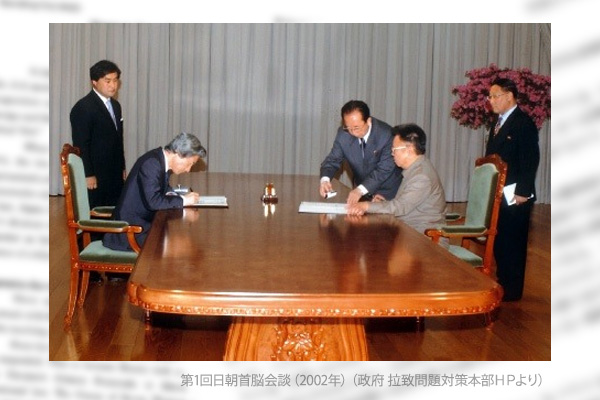On September 17, 2002, then Japanese Prime Minister Junichiro Koizumi visited Pyongyang and then North Korean leader Kim Jong Il admitted and apologized for North Korea’s abductions of Japanese citizens. However, Pyongyang unilaterally claimed that eight abductees were dead while five were alive. The claim included lies. Since the five abductees returned to Japan in October 2002 for the first time in 24 years, no other abductees have returned home.
Koizumi’s Pyongyang visit was epoch-making, but it fell short of resolving the abduction issue. Rather, the visit highlighted the depth of the issue.
Most importantly, the visit led to the possibility that there were a substantial number of unidentified abductees. This is because the five who returned home included Hitomi Soga who had not been identified as an abductee. Soga and her mother Miyoshi had been regarded only as missing.
North Korea characterized as abductor
Since the Soga case became known, many Japanese people inquired about their missing children, husbands, brothers or sisters. At that time, I happened to be in a position to register such information. Locations of their disappearance extended all over Japan and abroad. Times of disappearance extended from the days soon after World War II to the 2000s. Every case resembled the cases of identified abductees, featuring mysterious disappearance. I could not think that the resemblance is our imagination.
The breadth of locations and times for possible abductions became clear. North Korean abduction cases might not have happened accidentally in some specific period of time. This is understandable if the abduction practice is viewed as related to North Korean character.
When Korea was under Japanese rule, communist guerrillas attacked villages near the Manchuria-Korea border, abducting fellow Korean residents and robbing their assets such as oxen and horses. Such practices continued after the war. Abductions of residents and looting near the 38th parallel border between North and South Koreas, as well as abductions from the streets in Seoul and other cities, were frequently reported by South Korean newspapers. The North abducted some 90,000 citizens in the South during the Korean War and has not allowed them to return home. As for Japanese, legal experts and some other people were detained after the war. Abductions or detentions are not so special for North Korea.
Demonstrating Japan’s defenselessness
The abductions of Japanese citizens were inhumane state-sponsored practices conducted systemically by North Korea, amounting to the infringement of Japan’s sovereignty. While being close to such dangerous country, Japan has failed to be fully vigilant or take any countermeasures since the end of World War II. Any country must have power to counter illegal foreign state practices. The abduction issue has led Japan to realize defects in its defense,
Despite such facts unveiled 20 years ago, Japan has failed to resolve its own problem.
Nobuko Araki is a Korea researcher and a member of the Planning Committee at the Japan Institute for National Fundamentals.


